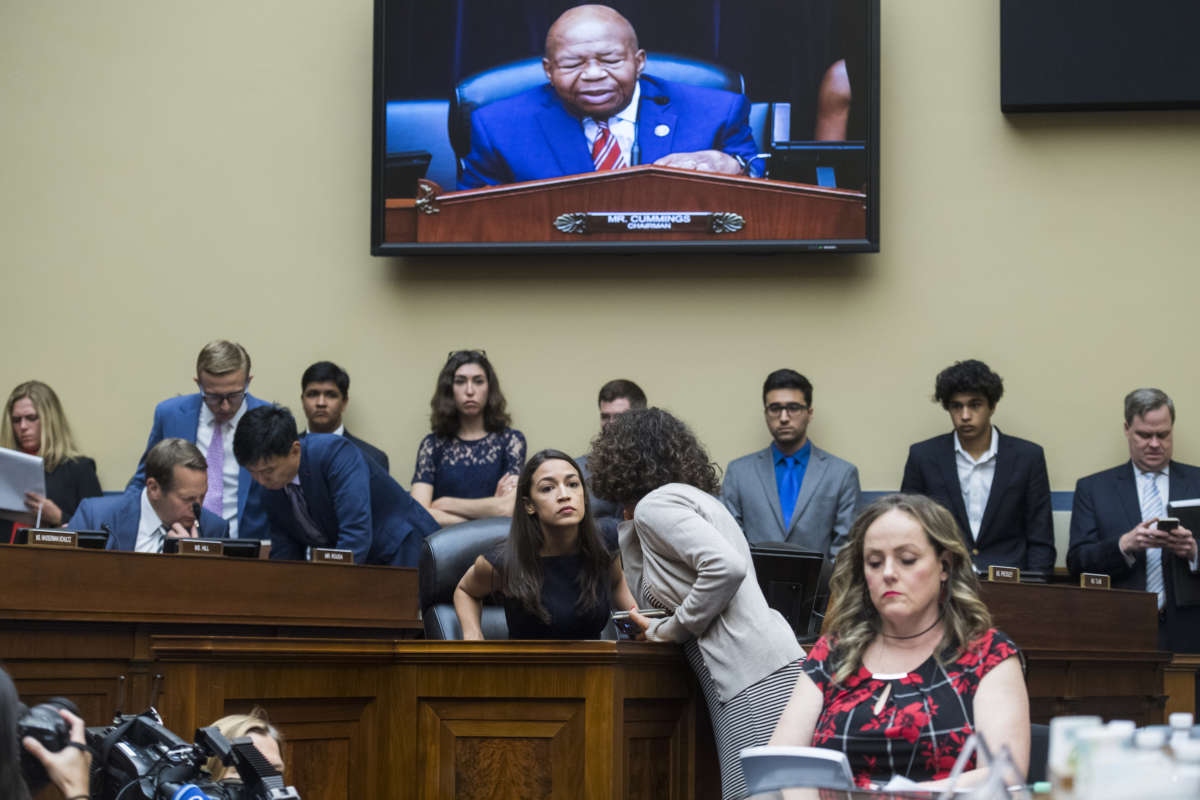Truthout is an indispensable resource for activists, movement leaders and workers everywhere. Please make this work possible with a quick donation.
Congressional staffers working in eight House offices have filed petitions to form Congress’s first-ever unions after being granted the right to do so in the spring.
House representatives voted to allow their staffers to unionize in a party line vote of 217 to 202 in May. The resolution, introduced by Rep. Andy Levin (D-Michigan), activated decades-old legislation that allowed workers to unionize but that required a separate vote explicitly endorsing the practice. After the legislation was published in the Congressional Record, there was a 60-day probationary period, which the Congressional Workers Union said ended on Monday, meaning that the workers are now free to unionize office-by-office.
“July 18 will go down as a historic day for congressional staff and our democracy — marking the day our protected rights to organize and bargain collectively go into full effect,” the union wrote in a statement. “After several months of organizing to establish these protections for House staff, we join 85 congressional workers in taking the next step in our organizing drive by filing for a union election in 8 offices in the U.S. House of Representatives.”
All eight of the offices that are now petitioning to unionize belong to Democrats. The offices that are unionizing are those of Representatives Cori Bush (Missouri), Chuy García (Illinois), Ro Khanna (California), Levin, Ted Lieu (California), Alexandria Ocasio-Cortez (New York), Ilhan Omar (Minnesota) and Melanie Stansbury (New Mexico). These offices will have to hold elections to decide whether or not to unionize.
“From Amazon and Starbucks to the halls of Congress to state legislatures across our country, every worker deserves the protected right of freedom of association, joining together with their colleagues in solidarity to organize and bargain collectively for a better workplace,” the union said on Monday. “We look forward to voting enthusiastically UNION YES in the coming weeks and sitting down at the bargaining table with our bosses.”
Lawmakers, including Bush, García, Khanna, Levin, Lieu and Omar, celebrated the filings. “I am so proud of the staffers who made a historic move today,” Levin said in a statement. “It is the workers who ensure that this institution — the bedrock of our fragile and precious democracy — operates efficiently and serves the American people here in the Capitol and in every corner of our nation.”
“My staff and staffers from seven other House offices made history today as they became the first Congressional offices ever to seek union recognition,” Bush said on Twitter. “Workers are stronger together, and I’m proud to stand in solidarity as they strive in making Congress a better workplace.”
Though there are Senate workers involved in the union, the Senate has not passed the corresponding resolution for its chamber, meaning that Senate staffers are currently barred from unionizing. Up until now, staffers have remained anonymous for fear of retaliation, which congressional workers in the Senate don’t have protection against, since the chamber hasn’t passed the resolution.
It’s likely that the legislation wouldn’t have the votes to pass in the Senate, with Republicans likely uniformly opposed and conservative Sen. Joe Manchin (D-West Virginia) having voiced his opposition shortly after the union drive was announced in February.
When workers announced their campaign, they had been organizing to unionize for over a year. They say that, while all congressional offices are different, congressional workers face widespread issues with low pay, long hours and otherwise exploitative conditions. In May, before the resolution was passed, they wrote in an op-ed that their jobs are filled with “cruel ironies”; while they advocate for higher pay, inclusive policies and recourse for sexual harassment for the public, many of them survive on food stamps and face abuse in the halls of Congress.
Poor working conditions not only affect the workers themselves, but also the entire country, for whom these staffers are working to write legislation and research bills that are coming to a vote. Workers say that there is a constant cycle of “brain drain” in Congress, as workers often move to lucrative jobs in the private sector that pay far more for their level of expertise.
Lawmakers have acknowledged this phenomenon. Stansbury told Bloomberg Law earlier this year that she has heard senior staffers and fellow lawmakers imply that staffers are “expendable,” or “a dime a dozen.”
A terrifying moment. We appeal for your support.
In the last weeks, we have witnessed an authoritarian assault on communities in Minnesota and across the nation.
The need for truthful, grassroots reporting is urgent at this cataclysmic historical moment. Yet, Trump-aligned billionaires and other allies have taken over many legacy media outlets — the culmination of a decades-long campaign to place control of the narrative into the hands of the political right.
We refuse to let Trump’s blatant propaganda machine go unchecked. Untethered to corporate ownership or advertisers, Truthout remains fearless in our reporting and our determination to use journalism as a tool for justice.
But we need your help just to fund our basic expenses. Over 80 percent of Truthout’s funding comes from small individual donations from our community of readers, and over a third of our total budget is supported by recurring monthly donors.
Truthout has launched a fundraiser, and we have a goal to add 200 new monthly donors in the next 24 hours. Whether you can make a small monthly donation or a larger one-time gift, Truthout only works with your support.
